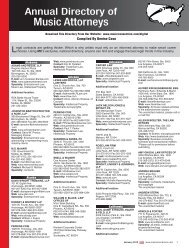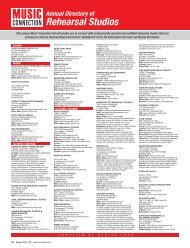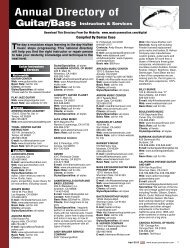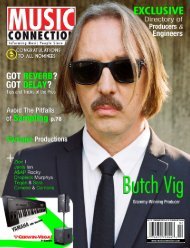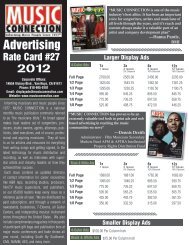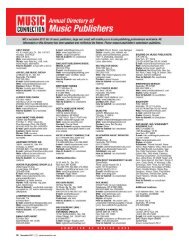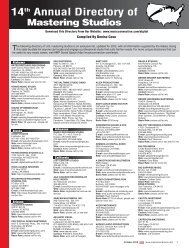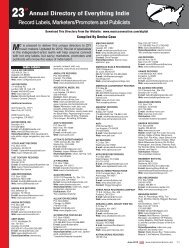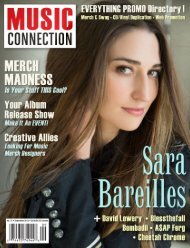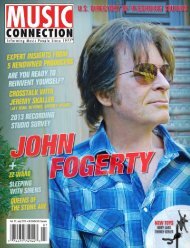CONTENTS
View/Download the new issue PDF here - Music Connection
View/Download the new issue PDF here - Music Connection
- No tags were found...
You also want an ePaper? Increase the reach of your titles
YUMPU automatically turns print PDFs into web optimized ePapers that Google loves.
Videotape Supplemental Markets Fund that is paid for by ABC-TV,<br />
since they own the cable station SOAPnet. This payment is for the<br />
past Union sessions I’ve produced for the daytime drama series All My<br />
Children, whose reruns are being shown on SOAPnet.<br />
In order to get paid, there must be an AFM session contract filed with<br />
the appropriate Local for the original session(s) for the sound recording.<br />
If you ever did an AFM session for live television, this is something you<br />
need to look into because they keep a page on their website that lists<br />
names of people who have unclaimed checks with the fund.<br />
A few years back, the payment schedule was erratic, but<br />
during the past two years the checks have become<br />
more stable, with an annual amount paid during<br />
the month of May. Though many of the soap<br />
series have been retired from the major<br />
networks, they have found a new home on<br />
cable TV and this is a great thing for the<br />
daytime composers like myself, since we<br />
all took a big hit when the majors canceled<br />
the shows.<br />
Know The Difference<br />
Again it is important to be clear that, like<br />
SoundExchange, the LTVSMF has its own<br />
area of focus compared to the Performance<br />
Rights Organizations. “The PROs manage<br />
performance royalties for composers and<br />
publishers of music,” adds Hoffman. “The Fund<br />
collects and distributes supplemental market<br />
payments due to musicians who performed under<br />
the AFM Television Videotape Agreement. The<br />
payments from the Fund are more of a delayed wage<br />
compensation closely related to residual payments,<br />
while payments from the PROs are royalties.”<br />
You may ask, “Hey, where does the money come<br />
from that the LTVSMF collects?” According to Hoffman, the<br />
Fund collects monies from companies that are signatory to<br />
the AFM Television Videotape Agreement. These are primarily<br />
the major television networks (ABC, CBS and NBC), as well as<br />
the Producers of the programs previously mentioned. “While the<br />
residuals come, in large part, from current programs,” she says, “a<br />
large number of older programs such as The Midnight Special, The<br />
Carol Burnett Show, The Tonight Show with Johnny Carson and<br />
many others also continue to pay residuals to the musicians who<br />
worked on those shows.”<br />
It is important to reiterate that the LTVSMF does not pay<br />
royalties, but rather deferred wages that come from the<br />
producer’s obligation to report and pay on supplemental<br />
market revenue such as DVD sales, in-flight uses, uses on<br />
Basic and Standard Cable, etc.<br />
“Payments<br />
can often<br />
continue for many<br />
years beyond the<br />
time when these<br />
Find Out About Neighboring Rights<br />
If you are a music performer/artist or a label owner<br />
who owns the master to commercial releases, there is<br />
another royalty stream, called Neighboring Rights, that<br />
cannot be overlooked.<br />
All of the details and payment parameters for<br />
Neighboring Rights have been outlined in the 1961<br />
Roman Convention Treaty (http://tinyurl.com/kz245pq). The<br />
Convention secures protection in performances of performers,<br />
phonograms of producers of phonograms and broadcasts of<br />
broadcasting organizations. Typically, in regards to Neighboring Rights,<br />
the song is split into two halves: 50 percent goes to the Masters and<br />
50 percent goes to the Performer. Money is collected from radio, TV,<br />
theaters, clubs, restaurants, various streaming sources such as web<br />
radio, satellite radio and other digital transmissions. Plus, collections<br />
are made from private copying levies on blank recording media.<br />
Not all countries, however, have neighboring rights representation<br />
or participate in generating royalties. Participating countries to the<br />
treaty, well over 30 in all, include Australia, Brazil, Canada, Congo,<br />
France, Germany, Great Britain and Japan. (See the above link for a<br />
complete list.)<br />
Since the US is not included on this list, it can be a bit tricky for<br />
American artists. For an American artist to be eligible, the music must<br />
have been recorded in one of the participating countries. Lucky for<br />
me, some of my releases on Instinct Records are eligible because I<br />
recorded them in England, a country that is part of the neighboring<br />
rights pact.<br />
So if you recorded or mastered your CD in one of the participating<br />
countries, you qualify as well. Complicated yes, but it is the reality. I<br />
looked into various companies out there to collect these royalties for me,<br />
but unfortunately, for obvious reasons, America does not have many.<br />
Sena<br />
After doing copious research, I joined the Dutch society, simply known<br />
as Sena (http://sena.nl), to collect for me worldwide. Sena grants<br />
licenses on behalf of the right holders to companies or organizations<br />
that use music, and they collect the associated fees. Sena also<br />
monitors and registers where, how and with what purpose music is<br />
played, to get the appropriate license.<br />
Does this sound familiar? Well, it should, because they are a lot<br />
like the PROs except they handle the rights of the master<br />
holders and the performers. I wish America had a<br />
domestic society like this. The closest we have is<br />
SoundExchange.<br />
programs were<br />
first produced.”<br />
– Shari<br />
Hoffman,<br />
LTVSMF<br />
Who is represented by Sena?<br />
Sena grants licenses on behalf of the rightholders<br />
to companies that use music, and they collect<br />
the associated fees. Sena, additionally, monitors<br />
and registers where, how and with what<br />
purpose music is played. Then they distribute<br />
the royalties correctly to their producers and<br />
artists. As a neighboring rights society, Sena<br />
represents Phil Collins, Coldplay, the Beatles,<br />
the Rolling Stones, Mumford & Sons, Black<br />
Eyed Peas and Christina Aguilera. Like our<br />
American PROs, Sena has the laborious<br />
task of inspecting playlists from radio and<br />
television stations.<br />
Sena abides by The Dutch Neighbouring<br />
Rights Act of 1993, which gives performing<br />
artists, film/record companies and broadcasting<br />
organizations the right to decide whether a<br />
performance may be recorded, reproduced or<br />
broadcast, shown or played. They have what<br />
is called a “right to payment,” which allows<br />
commercially released music to be broadcast, with<br />
the stipulation of a reasonable fee being paid.<br />
I'm so pleased to know they enforce that “failure<br />
to comply with the Neighbouring Rights Act is a<br />
punishable offence.” Hell, if they enforced that in the<br />
US, two-thirds of the country would be punished.<br />
Last Word<br />
As an indie artist, it is important to be involved with all<br />
of these companies, so you can enjoy all of your future<br />
royalties. As we know, royalties do not always get paid<br />
to the appropriate person, but that does not mean you<br />
should just sit and let it happen. You have to actively<br />
search them out and get the right companies to represent<br />
your music.<br />
I actually found out about royalties Sena was holding for<br />
me when I was contacted by a Dutch sub-publisher via email.<br />
He wanted to collect them on my behalf (how sweet), but for<br />
an outrageous fee of 50 percent! Absolutely ridiculous! So I<br />
contacted Sena directly, joined and got paid royalties owed.<br />
One of the most important pieces of advice I can give<br />
anyone about any royalty source is to be sharp and on your<br />
game. Soak up as much knowledge about it as you can.<br />
Questions are your friend.<br />
BRIAN TARQUIN is the winner<br />
of multiple Emmy Awards,<br />
having established himself<br />
as a top-rated TV composer/<br />
guitarist. In 2006 SESAC<br />
honored him with the Network<br />
Television Performance<br />
Award. In addition, Tarquin<br />
has produced and composed<br />
the Guitar Masters series,<br />
trading licks with such guitar<br />
greats as, Leslie West, Steve<br />
Morse, Billy Sheehan, Frank<br />
Gambale, Andy Timmons,<br />
Chris Poland (Megadeth) and<br />
Hal Lindes (Dire Straits). For<br />
further information, visit http://<br />
tvfilmtrax.com.<br />
42 November 2013 musicconnection.com



